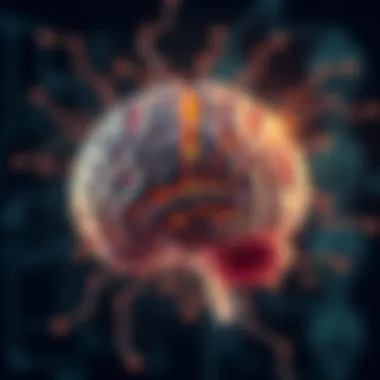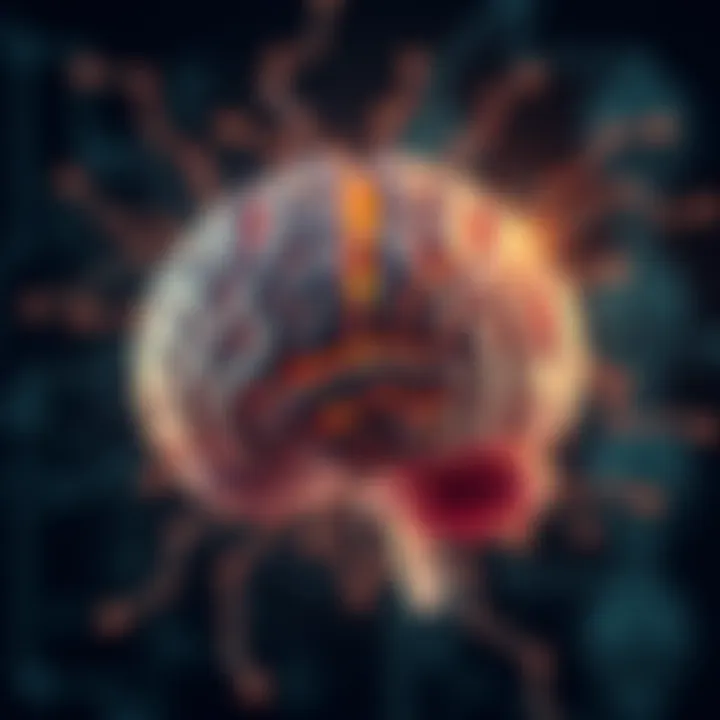Comprehensive Guide to Cognitive Disorder Symptoms


Overview of Research Topic
Cognitive disorders represent a significant public health concern, affecting millions surpassing the simple misplacement of car keys or moments of forgetfulness most people experience. These disorders extend far deeper, encompassing conditions such as Alzheimer's disease, dementia, and various forms of amnesia, drastically impairing one’s ability to think clearly, remember past events, and reason logically.
Brief Background and Context
The landscape of cognitive disorders is complex and multifaceted. Cognitive disorders can arise from a plethora of factors including neurological damage, genetic predispositions, or even environmental influences. For instance, traumatic brain injuries often lead directly to impairments in cognitive function, presenting a pressing issue in both clinical settings and everyday life.
From the moment a cognitive disorder presents itself, it may be misunderstood or mistaken for other common issues. This adds a layer of urgency for further education and awareness, not just among healthcare professionals, but also within families and communities as a whole. Engaging narratives and hard-hitting data illustrate just how crucial it is to recognize and understand these symptoms early on.
Importance in Current Scientific Landscape
As our population ages, the focus on cognitive disorders has become more pronounced. Increased research funding has laid the groundwork for a better grasp of why these disorders occur and how they can be treated or managed. In this era of rapid scientific advancement, the intersection of neuroscience and psychology stands at the forefront, paving the way for innovative therapies and support systems. Understanding cognitive disorder symptoms serves not only as a deterrent to stigma but also acts as a vital resource in instigating early intervention, ultimately improving patients' quality of life.
Methodology
A systematic approach is necessary when studying cognitive disorders to yield equitably credible outcomes. The following sections investigate established designs and tools in contemporary research.
Research Design and Approach
Research on cognitive disorders often employs mixed-method studies, blending quantitative techniques with qualitative insights. For example, survey methods can uncover patterns in symptomatology, while in-depth interviews may reveal how these experiences vary across demographics. Observational styles, too, allow researchers to note real-time behaviors and their implications.
Data Collection Techniques
Data collection for cognitive disorders often involves a robust framework that incorporates:
- Clinical assessments: Standardized tests that measure memory, reasoning, and executive function.
- Neuroimaging: Utilization of MRI or CT scans to visualize structural changes.
- Patient and caregiver reports: Self-reports and feedback from families to understand daily impacts and alterations in behavior.
Such varied techniques not only enhance the richness of data but also ensure a well-rounded understanding of cognitive disorders.
"Understanding symptoms can't just be an academic exercise; it has real-world implications that can impact lives for the better."
The journey through cognitive disorders, though laden with challenges, reveals insights that are crucial in pushing the boundaries of science and improving aid for those affected.
Defining Cognitive Disorders
Defining cognitive disorders is vital in understanding their impact on individuals and society. These disorders affect critical functions of the human brain, altering the way individuals think, learn, and interact with the world around them. Without a clear definition, misunderstanding can lead to stigmatization and misdiagnosis, which complicates treatment approaches and potential recovery. The classification of cognitive disorders informs research, clinical practice, and the development of coping strategies. In this section, we will explore the subtleties embedded in cognitive functioning and the necessity of precise categorization in shedding light on these complex conditions.
Overview of Cognitive Function
Cognitive function encompasses a variety of mental processes, including perception, attention, memory, reasoning, and decision-making. It is the foundation upon which our ability to learn, interpret information, and engage with others resides. Imagine a symphony where different instruments play in concert; cognitive function operates much the same way—the interplay among its components creates a cohesive experience.
Key aspects of cognitive function include:
- Attention: The ability to focus on specific stimuli while tuning out others. Think of a spotlight illuminating a dancer on stage while the background remains in darkness.
- Memory: The capacity to store and retrieve data—from recalling a friend’s birthday to remembering complex concepts in a lecture.
- Reasoning: The process of forming conclusions and making decisions based on the available information, akin to piecing together a jigsaw puzzle.
- Problem-solving: This involves applying knowledge to troubleshoot issues, looking at problems from different angles until the right solution emerges.
As cognitive disorders affect these functions, understanding their nuances becomes essential for anyone studying, treating, or living with these conditions.
Categorization of Cognitive Disorders
The categorization of cognitive disorders helps delineate the various conditions that affect cognitive function. By organizing these disorders into recognizable groups, professionals can better target their assessments and treatment approaches.
Cognitive disorders can be broadly characterized into a few categories:
- Dementia: A general term for a decline in cognitive ability severe enough to interfere with daily life. Alzheimer’s disease falls under this umbrella, among others.
- Mild Cognitive Impairment (MCI): A noticeable decline in cognitive abilities that is not yet severe enough to be classified as dementia.
- Traumatic Brain Injury (TBI): Damage to the brain resulting from an external force, often leading to temporary or permanent cognitive deficits.
- Alzheimer’s Disease: A progressive form of dementia marked by memory loss, confusion, and behavioral changes.
- Frontotemporal Disorders: A group of conditions that primarily affect the frontal and temporal lobes of the brain, impacting behavior and language skills.
Understanding these categories is crucial for developing effective treatments and support systems. Each category encompasses distinct symptoms and progressions, making it vital for professionals in health and education to recognize their unique presentations.
Common Symptoms of Cognitive Disorders
When delving into the world of cognitive disorders, recognizing their symptoms is paramount. These symptoms can range widely and often provide the first clues to underlying issues. The ability to identify these signs is crucial for timely diagnosis and effective treatment. Symptoms of cognitive disorders not only affect the patients but also their families and friends, thus, understanding them fosters better communication and support.
Memory Impairments
Memory impairments are often a hallmark of cognitive disorders. They manifest in various ways, primarily through short-term memory loss and long-term memory difficulties. Both types of memory issues can significantly impact daily living, making it impossible for individuals to recall recent events or past experiences.
Short-term memory loss
Short-term memory loss refers to the difficulty in retaining information recently acquired. This can be as simple as forgetting a conversation from minutes ago. One key characteristic of short-term memory loss is its fleeting nature; these memories often don’t last beyond a few moments. This topic is paramount as it illustrates the immediate effects of cognitive disorders on individuals. A unique feature of this type of memory impairment is that it often supports the perception of cognitive decline among affected individuals.
The advantage here is that recognizing short-term memory loss can initiate a deeper examination of cognitive health. However, one disadvantage is that it can lead to frustration, as individuals may feel confused or embarrassed when they can’t recall information that should be easy to remember.
Long-term memory difficulties
Long-term memory difficulties, on the other hand, delve deeper into someone’s past. This symptom may present itself as an inability to recall family events or learned information from years back. A key characteristic is that these memories, once stable, begin to fade or become distorted. Discussing long-term memory difficulties is significant because it touches on a person’s identity; losing these memories can be distressing and diminish a person’s sense of self.


A unique feature of long-term memory issues is how they may affect relationships. Often, family and friends bear witness to changes in personality or behavior. The advantage of acknowledging these difficulties is understanding the need for ongoing support systems. Conversely, the disadvantage is that such losses can result in emotional pain both for the individual and their loved ones.
Difficulty with Concentration
Difficulty with concentration is another pervasive symptom of cognitive disorders. This includes challenges in attention span and problems with multitasking, both of which can impair day-to-day functioning.
Challenges in attention span
Challenges in attention span indicate that an individual struggles to focus on tasks or conversations. This symptom can manifest in various settings, from workplaces to social gatherings. What stands out about attention span challenges is how they affect productivity and interpersonal relationships. Misunderstandings may crop up if someone is not fully present during discussions. This topic holds relevance as it directly links cognitive function to an individual’s performance in everyday life.
A unique feature of attention span issues is that they may lead to increased stress, especially in environments that require sustained focus. The downside is that such challenges can lead to feelings of inadequacy or failure, leaving individuals feeling overwhelmed.
Problems with multitasking
Problems with multitasking are a significant concern as they highlight cognitive overload. Essentially, when individuals struggle to manage more than one task at a time, it can impact daily activities. One key characteristic is the marked reduction in efficiency; tasks that should be simple become increasingly complex. This topic is beneficial for understanding the limits of cognitive processing.
The unique feature here is that multitasking difficulties often bring attention to what's achievable; many may not realize how demanding tasks can become due to cognitive disorders. However, the disadvantage of this symptom is that it can lead to damaging work relationships and a decline in personal well-being.
Language and Communication Issues
Language and communication issues depict another layer of cognitive disorder symptoms. Aphasia and related disorders, alongside struggles with vocabulary and comprehension, serve to hinder effective communication.
Aphasia and related disorders
Aphasia is characterized by the loss of the ability to express or understand language. The complexity and nuances involved in this symptom make it a significant discussion point. One key characteristic of aphasia is its impact on both spoken and written language, reflecting how cognitive disorders can bear down on fundamental aspects of communication.
This is beneficial in the article as it underscores the clinical seriousness of cognitive disorders. A notable feature is that aphasia can appear suddenly, often following a stroke or brain injury. The advantage of understanding aphasia lies in its potential for rehabilitation, but the disadvantage is that it can leave individuals feeling isolated as they struggle to communicate with those around them.
Struggles with vocabulary and comprehension
Struggles with vocabulary and comprehension reflect another dimension of language impairment, where individuals find it challenging to use or understand words effectively. What stands out is that these language difficulties often lead to confusion and frustration during conversations, affecting personal and professional relationships. This aspect is crucial for the article as it is often the less visible, yet profound, strain cognitive disorders impose.
Unique features include how these struggles can oscillate; some days they may articulate eloquently, while on others, they might get stuck searching for words. The advantage here is the potential for understanding the fluctuating nature of cognitive disorders, while the disadvantage is the unpredictable emotional toll it takes on individuals.
Impaired Decision-Making
Impaired decision-making encapsulates various challenges that arise in many cognitive disorders. This includes difficulty in planning tasks and challenges with judgment, both critical for daily life.
Difficulty in planning tasks
Difficulty in planning tasks signifies an inability to organize thoughts or actions effectively. Whether it’s a simple plan for grocery shopping or a complex work project, this symptom highlights the struggle cognitive disorders can impose. A key characteristic is the inability to sequence activities logically. This aspect is essential for understanding how individuals cope with the demands of life, making it a relevant topic.
A unique feature of this symptom is that it often leads to conflicts in home life or work situations where planning is paramount. The advantage of recognizing such difficulties shines a light on the need for adaptive strategies. However, the disadvantage is the risk of disorganization and missed deadlines, potentially spiraling into stress or anxiety.
Challenges with judgment
Challenges with judgment underline another layer of cognitive disarray. Here, individuals may find it hard to evaluate situations or make considered decisions. This symptom can have far-reaching implications, especially in personal life choices. One key characteristic is the inconsistency in decision-making, which can lead to significant repercussions.
Discussing challenges with judgment is beneficial for understanding the social dynamics involved, as these difficulties can hinder an individual’s ability to engage meaningfully in society. A unique feature of this challenge is how it may lead to reliance on others for decision-making, losing autonomy as a result. The advantage of examining this symptom is the potential for intervention strategies, but the disadvantage is the vulnerability it can create when faced with important life decisions.
Types of Cognitive Disorders
Understanding the various types of cognitive disorders is crucial in grasping the broader context of cognitive health. Each type offers specific characteristics, symptoms, and challenges that can significantly impact individuals and their families. By recognizing these distinct categories, we can develop tailored interventions and enhance support mechanisms for those affected. Additionally, understanding these types can foster awareness in educational and professional settings, thus dispelling common myths associated with cognitive disorders.
Dementia
Dementia is an umbrella term covering a range of memory-related conditions, not a specific disease. It often impacts daily functioning and creates hurdles in handling routine tasks. Symptoms may include confusion, mood swings, and changes in behavior. Often, caregivers struggle with the unpredictability of the symptoms, causing added stress not only to patients but also their families.
Examples of dementia include:
- Alzheimer’s Disease: The most common form, characterized by memory loss and cognitive decline.
- Vascular Dementia: Resulting from reduced blood flow to the brain, often following a stroke.
- Lewy Body Dementia: Impacts movement alongside cognitive deficits, often leading to visual hallucinations.
Recognizing the early signs of dementia can facilitate timely interventions, potentially slowing progression.
Mild Cognitive Impairment ()
Mild Cognitive Impairment sits in the gray area between normal age-related changes and more serious conditions like dementia. People with MCI may notice changes in their cognitive abilities, primarily related to memory, but these do not significantly affect daily life. It’s like walking a tightrope—there’s a fine line between normal functioning and potential disorders.
The benefits of identifying MCI include:
- Early detection can lead to better management and lifestyle adjustments.
- Understanding MCI can prepare patients and families for possible future developments.
- Crafting personalized treatment strategies for those diagnosed.
Traumatic Brain Injury (TBI)
Traumatic Brain Injury results from an external force causing brain dysfunction, often due to accidents or sports injuries. The severity can vary wildly, and symptoms can manifest immediately or show up gradually over time.


Common symptoms of TBI include:
- Headaches and dizziness.
- Memory problems or conflicts in reasoning.
- Changes in mood or personality.
Addressing TBI promptly can mitigate further risks, making awareness crucial among athletes and first responders.
Alzheimer’s Disease
Alzheimer’s Disease, a specific form of dementia, primarily affects older adults. It’s notorious for its insidious onset, often starting with forgetfulness and progressing to severe cognitive decline. Patients may find the world a confusing puzzle, struggling with basic communication and daily chores.
Key aspects to note:
- Early Symptoms: Memory lapses, misplacing items, difficulty completing familiar tasks.
- Progression: Typically, it worsens over time, leading to significant dependency.
- Current Treatments: While no cure exists, certain medications may help manage symptoms or delay progression.
Frontotemporal Disorders
Frontotemporal Disorders refer to a group of conditions that primarily impact the frontal and temporal lobes of the brain. These areas control personality, behavior, and language; thus, it can elicit drastic shifts in character and emotions. Frontotemporal Dementia often presents different symptoms compared to more recognized forms of dementia, which can lead to misdiagnosis.
Characteristics of Frontotemporal Disorders can include:
- Significant personality changes or socially inappropriate behavior.
- Progressive loss of language skills.
- Impaired reasoning or emotional responses.
Awareness of such disorders can foster understanding among caregivers and loved ones, allowing for better management strategies.
Through this exploration of cognitive disorder types, it becomes clear that each category offers distinct challenges. Recognizing and understanding these differences can prepare individuals and caregivers for the journey ahead, ultimately improving the quality of life for those affected.
Diagnosis of Cognitive Disorders
Understanding the diagnosis of cognitive disorders is crucial for several reasons. Firstly, accurately identifying these disorders ensures that individuals receive the appropriate interventions at the right time. Misdiagnosis can lead to ineffective treatments that may exacerbate symptoms or overlook underlying conditions. Additionally, comprehension of the diagnostic process fosters awareness among those suffering and their families, allowing for informed decisions catering to health management.
Another vital element to consider is that cognitive disorders vary significantly in terms of their symptoms and causes. Therefore, a thorough diagnosis includes a nuanced approach tailored to the individual's situation. This comprehensive evaluation not only helps in confirming the presence of a cognitive disorder but also aids in distinguishing it from other medical or psychological issues that could yield similar symptoms.
Clinical Assessment
The clinical assessment serves as the bedrock for diagnosing cognitive disorders. It involves a systematic process where medical history, physical examination, and psychological evaluations are utilized to form a complete picture of the individual's health status. Usually, the clinicians begin with an interview, delving into the individual's health background, any previous episodes of cognitive impairment, and other relevant life factors.
During this assessment, practitioners often administer a series of standardized questionnaires or scales designed to evaluate various cognitive areas. These may include memory, reasoning, and executive functions. The clinicians look for patterns that are consistent with specific cognitive disorders, which can often feel like connecting dots in a complex puzzle.
- Benefits of Clinical Assessment
- Establishes a baseline for cognitive function.
- Helps track changes over time.
- Facilitates communication among health professionals regarding treatment plans.
A long-term relationship between the clinician and patient can enhance the assessment process, as an established rapport often results in more accurate information sharing.
Neuropsychological Testing
On the other hand, neuropsychological testing dives deeper into the brain's functional domains and offers specific insights into cognitive abilities. This assessment typically follows the clinical evaluation, aiming to quantify the severity and nature of cognitive impairment.
Such testing usually involves a range of tasks designed to measure memory, attention, problem-solving skills, and language abilities. Unlike general cognitive assessments, neuropsychological tests can pinpoint individual strengths and weaknesses. For instance, a person might excel in verbal tasks while showing pronounced difficulties with spatial reasoning, providing essential information that shapes therapeutic approaches.
Some of the most commonly used neuropsychological tests include the Wechsler Adult Intelligence Scale and the Mini-Mental State Examination. The results from these tests can help both the clinician and the patient better understand how the cognitive disorder impacts daily functioning.
In summary, diagnosing cognitive disorders is a multi-faceted process that requires careful clinical assessments and targeted neuropsychological testing. Both approaches complement each other, contributing to an accurate diagnosis that fosters appropriate intervention strategies. For those interested in digging deeper into this complex topic, various resources, such as National Institute of Health and American Psychological Association, offer invaluable information.
Impact of Cognitive Disorders
Cognitive disorders exert a profound influence on individuals' lives, impacting not merely the internal cognitive functions but extending to various facets of everyday life. Understanding this impact is crucial, as these disorders can lead to a cascade of challenges that alter a person's sense of identity and their interactions with the world.
Effects on Daily Life
Cognitive disorders manifest differently from person to person, but the underpinning consequence is often a significant disruption in daily activities. Tasks that many take for granted may become Herculean challenges for those affected. Consider a scenario where someone with early dementia struggles to recall familiar routes; what once was an automatic journey to the local grocery store might require concerted effort and external aids. The frustration breeds further cognitive fatigue and a sense of helplessness.
Moreover, household responsibilities like cooking or budgeting can feel overwhelmingly taxing. Common activities suddenly seem foreign and unmanageable, leading to an increased reliance on family members for basic errands.
For caregivers, the impact is no less significant. The strain of assisting loved ones grappling with cognitive deficits can foster feelings of stress and overwhelm.
Cognitive disorders are not merely challenges of memory; they are journeys through confusion that affect the very fabric of daily existence.
Here are a few specific daily life aspects affected by cognitive disorders:
- Self-Care: Maintaining personal hygiene and grooming can become daunting.
- Social Interactions: The ability to engage in cherished social activities might diminish.
- Work Performance: Professional obligations may suffer, leading to reduced work quality and productivity.
Social and Emotional Consequences
The emotional weight of cognitive disorders can be just as heavy as their logistical burdens. Individuals may face an emotional rollercoaster that includes denial, anger, and sadness as they adjust to their changing abilities. The loss of cognitive function can instigate profound grief, not only for those diagnosed but for family and friends as well, who witness the decline in their loved ones. The feeling of isolation can creep in as social circles shrink, stemming from embarrassment or the inability to participate in conversations or activities as before.


Social withdrawal can create a detrimental feedback loop—less interaction equates to increased feelings of loneliness, which can further exacerbate cognitive decline. Peer relationships often adapt poorly; friends may feel uncomfortable or unsure how to behave around someone with cognitive impairment, causing disconnect and potential loss of camaraderie.
- Stigma: Many affected feel societal stigma, a factor that can exacerbate self-esteem issues and may lead to reluctance in seeking help.
- Family Dynamics: Roles within families can shift, creating tension and altering relationships in ways that might take years to mend.
Recognizing and acknowledging the comprehensive effects of cognitive disorders is of utmost importance. Through understanding, caregivers can form supportive environments, and individuals with cognitive challenges can feel a reinforcement of their identity beyond their condition.
Treatment Options for Cognitive Disorders
Treating cognitive disorders is not a one-size-fits-all approach, as these conditions manifest differently depending on the underlying causes and symptoms. Addressing these disorders effectively involves a multifaceted strategy to improve the quality of life for affected individuals. The significance of understanding treatment options cannot be overstated; it provides a pathway for intervention that can markedly enhance cognitive function and help reclaim functionality.
In this section, we'll delve into two main types of treatment options available: pharmacological approaches and cognitive rehabilitation therapy.
Pharmacological Approaches
Pharmacological treatment for cognitive disorders emphasizes the use of medications to manage symptoms and potentially slow down progression. Here's a closer look:
- Types of Medications: Various classes exist, including cholinesterase inhibitors such as donepezil, which are prescribed primarily for Alzheimer’s disease. These aim to boost levels of neurotransmitters, helping with memory and cognition. Additionally, antidepressants and anti-anxiety medications can aid in alleviating mood disorders that often accompany cognitive conditions.
- Thinking Regarding Side Effects: With the benefits, one must also consider potential side effects. Medications can sometimes lead to nausea, insomnia, or other unwanted effects. It's crucial for healthcare providers to carefully monitor the effects on patients and adjust the dosages or types of medication as needed.
- Collaboration with Healthcare Providers: Open communication with doctors is essential. Patients and their caregivers must discuss treatment options, expectations, and changes in symptoms. This partnership can help ensure that the medications prescribed continue to be suitable for the individual’s evolving needs.
"Finding the right balance in medication can often feel like walking a tightrope; one misstep, and you could end up on the ground."
Cognitive Rehabilitation Therapy
Cognitive rehabilitation therapy (CRT) takes a different approach, focusing on enhancing functional capabilities and compensatory strategies. It emphasizes reconstructing cognitive skills that have diminished, often enabling individuals to navigate life with greater ease.
- Personalized Strategies: CRT is tailored to the individual’s specific deficits. Therapists devise exercises aimed at improving memory, attention, problem-solving abilities, and daily functioning, crafting a program as unique as the individual themselves.
- Goal-Oriented Techniques: Utilizing goal-setting, therapists facilitate a process where patients can monitor their progress. Goals can be small but significant, such as remembering appointments or improving daily routines, leading to increased self-efficacy.
- Support and Empowerment: CRT often involves the family as well, helping them understand the condition, which further promotes a supportive environment. This support can be crucial, as family members can lend emotional encouragement during challenging times.
In summary, both pharmacological and cognitive rehabilitation therapies serve essential roles in managing cognitive disorders. Each has its strengths and can be complementary in treatment approaches. Understanding these options enables patients, their families, and healthcare providers to work together for the best possible outcomes, leading to an improved life quality for those grappling with cognitive challenges.
Research Directions in Cognitive Disorders
Research into cognitive disorders is crucial for multiple reasons. Emerging trends in this field not only deepen our understanding of the complexities involved but also guide the development of novel treatments and diagnostic approaches. By focusing on Research Directions in Cognitive Disorders, we have an opportunity to address significant gaps in current knowledge and practice, enhancing patient care holistically.
As cognitive disorders continue to evolve in scope and complexity, it becomes imperative to shift research paradigms to include innovative methodologies. This exploration can help in identifying biomarkers aiding early diagnosis, leading to timely interventions. Moreover, it also paves the way for personalized treatment strategies that cater to individual patient needs, ultimately improving quality of life.
Emerging Therapeutics
In the realm of cognitive disorders, emerging therapeutics hold promise in reshaping treatment landscapes. One area of significant interest is the role of medication repurposing. Existing drugs, originally formulated for other conditions, are now being examined for their efficacy in treating cognitive impairments. For instance, certain antidepressants have shown potential in mitigating memory issues related to Alzheimer’s disease.
Another frontier is gene therapy. With advances in genetic understanding, scientists are exploring ways to alter genetic expressions linked to disorders such as Frontotemporal dementia. This approach aims to rectify underlying biological pathways rather than merely address symptoms. Early experimental phases have yielded encouraging results, yet much remains to be realized.
"Emerging therapies are not merely a flicker of hope; they represent the promise of transformative change in how cognitive disorders are approached and treated."
Additionally, non-invasive techniques like Transcranial Magnetic Stimulation (TMS) are gaining traction. TMS has the potential to enhance certain cognitive functions by stimulating targeted brain areas. This technique highlights the intersection of technology and neuropsychology, offering new avenues for recovery.
Innovative Diagnostic Techniques
As we advance in understanding cognitive disorders, so too must our diagnostic tools evolve. Innovative diagnostic techniques are reshaping how clinicians assess cognitive functions and disorders. Traditional methods often rely heavily on standardized tests, which may overlook subtleties in individual cases. Consequently, there's a need for complementary approaches that provide a more nuanced picture of cognitive health.
One promising direction involves the use of Artificial Intelligence (AI) in analyzing patient data. By integrating vast amounts of medical records, AI can identify patterns and correlations that might elude human analysis. For example, algorithms can flag early predictive signs of cognitive decline based on routine examinations, leading to preemptive measures.
Another intriguing approach is the utilization of neuroimaging technologies like functional MRI (fMRI) and PET scans. These methods provide real-time observations of brain activity and can highlight areas affected by cognitive disorders. By combining neuroimaging with machine learning techniques, researchers are beginning to classify cognitive disorders with unprecedented accuracy.
For more resources on cognitive disorders, you may refer to the links below:
End
Cognitive disorders present a significant challenge, not only for those who endure them but also for the families and systems that interact with them. The examination of symptoms associated with cognitive disorders is paramount for several reasons. First, recognizing the symptoms allows for an earlier diagnosis, which can be crucial for effective intervention. When issues like memory impairments or concentration difficulties are identified promptly, it opens the doors to possible therapies and coping strategies.
Moreover, understanding these symptoms fosters empathy and support from the community. Those with cognitive disorders often face misunderstanding, leading to further isolation. By raising awareness about specific symptoms—like impaired decision-making or language barriers—it encourages friends and family members to offer support without stigma. This can make a world of difference in the lives of those affected.
Cognitive disorders do not exist in a vacuum. Their implications stretch into various facets of life—social, emotional, and practical. This article aims to equip readers with knowledge that can bridge the gap between ignorance and understanding. Knowledge is power—especially when it comes to such a complex and often misunderstood field.
Summary of Key Points
Throughout the article, several key points were highlighted:
- Cognitive disorders encompass various conditions that impact thinking, memory, and reasoning.
- Symptoms can range from memory impairments and difficulties with concentration to serious language issues and impaired decision-making.
- Treatment options include pharmaceutical approaches as well as innovative cognitive rehabilitation therapies tailored to individual needs.
- Emerging research provides new avenues for understanding cognitive disorders and developing effective interventions.
Future Perspectives
Looking ahead, the landscape of cognitive disorder research is poised for growth. As technology advances, so do diagnostic techniques, promising more accurate and timely assessments of cognitive health. Virtual reality, for instance, is being explored as a medium for cognitive rehabilitation, thereby enhancing therapy experiences.
Additionally, there's a growing focus on personalized medicine. This approach may allow clinicians to tailor treatments based on individual genetics and lifestyle factors. It can lead to more effective interventions that resonate with the patient's unique disorder profile.
Furthermore, societal attitudes toward cognitive disorders are gradually evolving. Increased advocacy and education are essential to counteract stigma, ultimately fostering inclusive environments that support those affected.
By paying close attention to these developments, students, researchers, educators, and healthcare professionals can contribute to a more profound understanding of cognitive disorders and their implications. This knowledge can lead to more informed discussions and initiatives aimed at breaking down barriers and enhancing the quality of life for individuals struggling with cognitive challenges.
"The only way to deal with cognitive disorders is through awareness and understanding—key elements in paving the path for better care."
For further information, consider reviewing resources at Wikipedia or Britannica.



